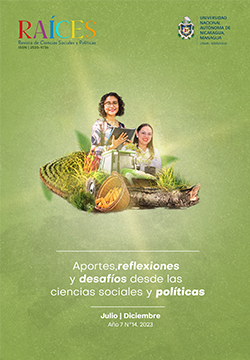Challenges of the Social Sciences in a multipolar world. ¿Is another social research possible?
DOI:
https://doi.org/10.5377/races.v7i14.17865Keywords:
Research, social sciences, epistemology, complexity, multipolarAbstract
The main purpose of the text is to generate some reflections from our academic and scientific reality in light of the challenges of the region and especially from Nicaragua and its transformation process. The authors focus the discussion on two points: the first refers to the dichotomous issue of linear research and complexity research. The second, from a more reflective perspective, focuses on the challenges posed by the position of the academy in the face of social, cultural and historical inequalities and in the face of a new multipolar world that demands from the academy scientists committed to contemporary reality.
Downloads
315
References
Avilés, R. M. (1983). No pararemos de andar jamás (Vol. 3). Editorial Nueva Nicaragua.
Balcazar, F. E., (2003). Investigación acción participativa (iap): Aspectos conceptuales y dificultades de implementación. Fundamentos en Humanidades, IV(7-8), 59-77. Recuperado en: https://www.redalyc.org/pdf/184/18400804.pdf
Denzin, N. K. y Lincoln, Y. S. Coord. (2012). El campo de la investigación cualitativa. Manual de investigación cualitativa. Vol. I. Barcelona: Gedisa editorial.
Dussel, E. (1973). Caminos de liberación latinoamericana II : teología de la liberación y ética. Buenos Aires: Latinoamérica Libros. Recuperado en: https://biblioteca.clacso.edu.ar/ clacso/otros/20120131101011/TEOLOGIA.pdf
Freire, P. (2005). Pedagogía del Oprimido 2da edición. México: Siglo XXI. Obtenido en: https://fhcv.files.wordpress.com/2014/01/freire-pedagogia-del-oprimido.pdf
Maldonado, C. E. (2015). Ciencias de la complejidad, educación, investigación. Tres problemas fundamentales. Formación en investigación: Desarrollo de competencias, 9.
Malinowski, Bronislaw. (1989). Diario de campo en Melanesia. Ediciones Júcar.
Mella, O. (1998). Naturaleza y orientaciones teórico-metodológicas de la investigación cualitativa. Recuperado en: https://uir.inie.ucr.ac.cr/cgi-bin/koha/opac-detail.pl biblionumber=2245&shelfbrowse_itemnumber=3642
Morin, E., y Pakman, M. (1994). Introducción al pensamiento complejo (p. 167). Barcelona: Gedisa editorial.
Najmanovich, D., (2001). Pensar la subjetividad. Complejidad, vínculos y emergencia. Utopía y Praxis Latinoamericana, 6(14), 106-111.
Solís Narváez, N. S. (2023). Raíces etnoculturales y perspectiva de desarrollo en comunidades periurbanas. Caso comarca La Hoyada de las Sierritas de Santo Domingo, Managua. Revista Torreón Universitario, 12(33), 57–73. https://doi.org/10.5377/rtu.v12i33.15891
Vermeulen, H.F. y Álvarez Roldán, A. (eds.) 1995. Fieldwork and Footnotes. Londres: Routledge. Pp. 143-158
Viniegra-Velázquez, L. (2019). Crítica de la causalidad mecanicista en las ciencias de la vida. Boletín Médico del Hospital Infantil de México, 155-166. DOI:10.24875/BMHIM.19000166
Zea, L. (1972). América como conciencia. México: Cuadernos Americanos. Recuperado de https://revistaliterariakatharsis.org/zea.pdf
Downloads
Published
How to Cite
Issue
Section
License
Copyright (c) 2023 © Universidad Nacional Autónoma de Nicaragua, Managua, UNAN-Managua

This work is licensed under a Creative Commons Attribution-NonCommercial-ShareAlike 4.0 International License.
This license enables reusers to distribute, remix, adapt, and build upon the material in any medium or format for noncommercial purposes only, and only so long as attribution is given to the creator. If you remix, adapt, or build upon the material, you must license the modified material under identical terms.




